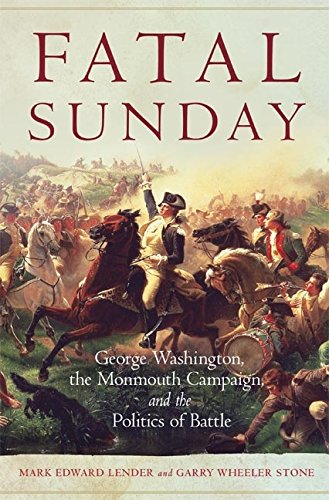Authors:
Historic Era: Era 3: Revolution and the New Nation (1754-1820s)
Historic Theme:
Subject:
Special Issue - George Washington Prize 2017 | Volume 62, Issue 4


Authors:
Historic Era: Era 3: Revolution and the New Nation (1754-1820s)
Historic Theme:
Subject:
Special Issue - George Washington Prize 2017 | Volume 62, Issue 4
Unlike Saratoga or Yorktown, the battle of Monmouth was not a clear-cut American victory. After a long, difficult day of fighting, the British surprised the rebels by abandoning their positions before the following dawn, and later claimed victory because their orders had been to march from Philadelphia to New York with their army and supplies intact, which they did. The authors of Fatal Sunday make a persuasive argument, however, that Monmouth was critical to the success of the Revolution and a decisive turning point in the career of George Washington.
--the Editors
The Battle of Monmouth was fought on Sunday, 28 June 1778. The bulk of the action took place just outside the village of Monmouth Court House (modern Freehold), New Jersey, the seat of Monmouth County. It was one of the largest battles in the War for American Independence, was the longest single day of combat, and marked the effective end of British efforts to achieve a military victory in the northern colonies.

The battle was part of a three-week campaign in mid-June and early July—the time it took the British to evacuate Philadelphia, march across central New Jersey, and reach safety in New York City. It pitted the rival commanders in chief, the American George Washington and the Briton Sir Henry Clinton, directly against one another; it was the only time they met in the open field. Monmouth saw some

particularly dramatic and bitter fighting, and it was the root of subsequent military and political controversies that reverberated through the army, in the Continental Congress, and across the rebellious colonies. It was a battle that gripped the public imagination, with many Americans initially believing it heralded an early end to the conflict. But even after these hopes had faded, and long after the guns had fallen silent, aspects of the Battle of Monmouth remained matters of contention. Some stories would echo into American folklore.
For patriots, Monmouth had immediate significance. At day-break on Monday, 29 June, exhausted rebel soldiers, who had slept on their arms expecting a resumption of the fighting, discovered that the battle was over. The British were gone, having moved out during the night; the astonished Continentals